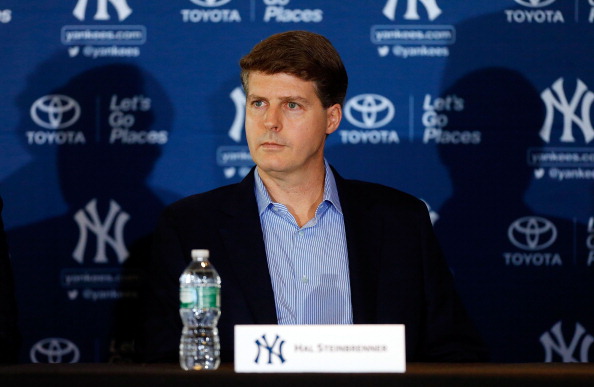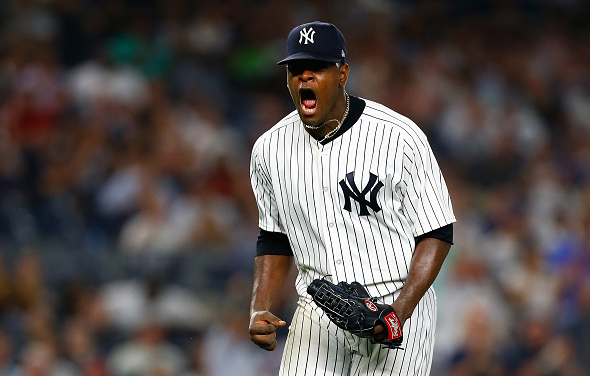In a recent interview with Bill Madden of the New York Daily News, Hal Steinbrenner offered up the following tidbit of information:
“I found (being called cheap) very interesting,” he said, smiling, “given that we offered $25 million (for Moncada) and spent substantially in the international market (a reported $26.82 million in bonuses and penalties for greatly exceeding their bonus allotment). I’m not saying we’ll never give another seven-year contract, but going in you know you’re probably only going to get three-four good years out of it. It remains my goal to get under that $189 million (luxury-tax threshold), but it’s not going to happen for at least two more years when these big contracts we have expire. But I’ve continued to say you shouldn’t need $200 million to win a championship.”
Okay, so that’s not groundbreaking news. Hal has stated his desire to get below $189 million for several years, causing many Yankees fans to froth at the mouth. The fans frustration was reasonably justified because of several long-term contracts hanging around the Yankees neck like an anchor. But with these contracts set to expire in the next couple of years, can $189 million be a realistic expectation? Does it need to be a realistic expectation?
First off, $189 million might not even be the luxury tax threshold once these contracts have expired. With the current Collective Bargaining Agreement set to expire after the 2016 season,common thought is that this threshold will rise. $200 million? $215 million? Salaries have been on the rise due to increased revenues in Major League Baseball and there is no doubt that the Players Association will want a larger portion of these revenues. With 16 of the 30 teams in MLB having payrolls over $100 million in 2014, $189 million is just not reasonable.
Signing free agents to big multi year contracts has been used to pump life into teams in the past. The Yankees used this strategy to win a World Series in 2009 and the Phillies used it in 2008. However, its long term effects are usually not wise business moves. Both teams have had to endure the downside to these contracts in the last few seasons. Two things are in the Yankees favor between now and 2017. The albatross contracts of these aging players are set to expire and the payoff of a newly revitalized farm system.
The contracts of Mark Teixeira ($23.125 million) and Carlos Beltran ($15 million) are set to expire after the 2016 season. CC’s contract has a vesting option for 2017 that is conditional on the health of his right shoulder and a few other factors. Worse case, his contract ($25 million) is off the books after 2017. The same could be said for Alex Rodriguez‘s deal. His $21 million will definitely be gone after 2017, but who knows what is in store with him between now and then.
What could really make things pay off is if the farm system starts to produce quality major leaguers. The arrival of Greg Bird and Aaron Judge could easily correspond with the departure of Teixeira and Beltran. Luis Severino and Rob Refsnyder could combine with these two to give the Yankees a shot in the arm of youth and ability. If Severino could replace Sabathia, the Yankees could possibly have a quality starting rotation that would all be under the age of 30 in 2017.
It would be easy to see these youngsters under team controlled and team friendly contracts in a lineup with Tanaka, Betances, McCann, Headley, Gardner, and Ellsbury paying big dividends. Replacing their largest contracts with ones at or near major league minimum should give the Yankees brass the ability to get out from under the luxury tax bill and the flexibility to put a better quality product on the field. But this is still the New York Yankees and the desire to win and put fans in the seats are the driving forces behind decision making in the Bronx. Will the Yankees put enough of a quality product on the field between now and 2017 to allow these players to develop or will they succumb to the desire of fans to win now?
Whether or not Hal Steinbrenner chooses to have a $50 million payroll or a $300 million payroll is neither here nor there. The bottom line is winning in New York. The Yankees have been and still are paying the price for misguided spending in the past. Hal has signaled that they want a change in philosophy from spending money on long term free agent contracts to spending it on more team friendly contracts with a renewed emphasis on minor league system development. The problem for Yankee fans is that this kind of change in operating philosophy takes time to implement and the true payoff may not come until after many current contracts are off the books. Like his father, Hal is in a battle of wills with fans spoiled by the success of past seasons. Here’s to the hope that the next Yankees World Series win will be sooner than later. It’s what fans and ownership want. There are just differing opinions on how to get there.




